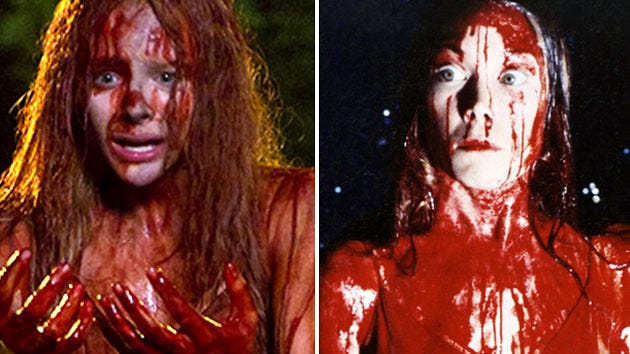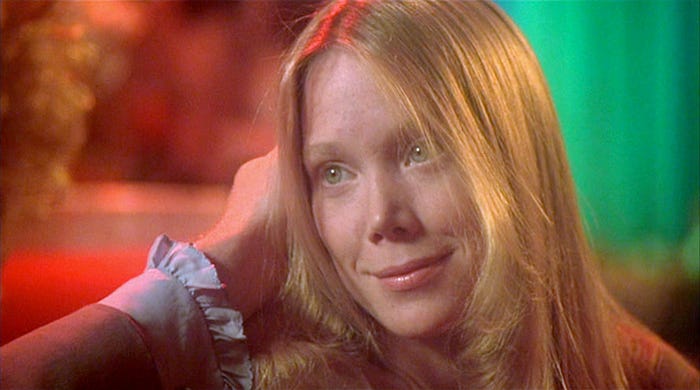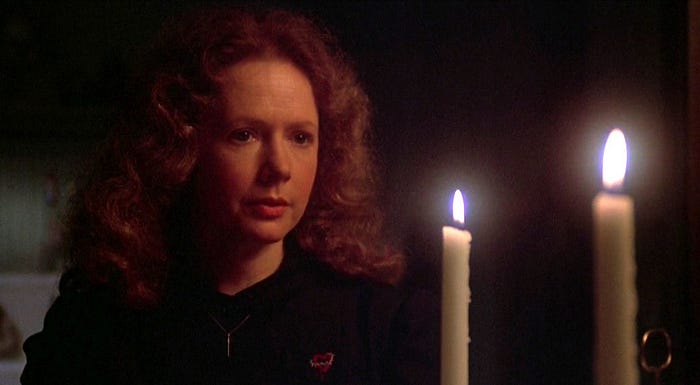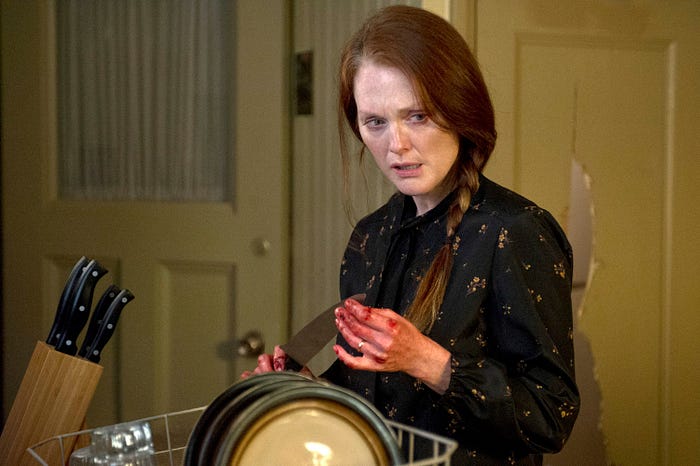Carrie Vs Carrie Vs Carrie

I re-read Stephen King’s 1974 book, and I want to compare the 1976 movie version, which stars Sissy Spacek, and the the 2013 version, starring Chloe Grace Moretz, to the book version, because there are some significant changes from book to film. I’m going to argue that the book version still has not really been filmed yet. All of the significant high points are in the movies but there is also much that is absent.
One thing I’m unclear on is if King was trying to write a feminist manifesto. He says he wasn’t, and I don’t think he was, despite that he was writing his novel during feminism’s early years. His women aren’t perfect, and that’s the point. They don’t seem to be just some guy’s idea of women. They’re intelligent and decisive women,and King has a good grasp of their characters.The weakest character is Margaret White, but King has always had trouble writing about religious women. The caricature of Margaret White would eventually find her way into his novella, The Mist, as Mrs. Carmody, another murderously insane woman who wears a mask of religious piety.
One of the changes between the book and the films, and its something which always seems to surprise readers who come to the book after watching them, is that the entire novel is told in flashback, in the form of newspaper articles, interviews, and book excerpts. Even more surprising are the few chapters where Carrie gets to speak for herself, and we’re privy to her thoughts and feelings about her life, how she feels about her mother, her abilities, and her plans for the future.
Neither of the movie versions interpret Carrie, (Carrietta), entirely the way she is in the book. I hadn’t read this book for many years and I was struck by her self-awareness, and how vengeful she is, compared to the movie versions,(although the Moretz version seems smarter than the Spacek version of her, and is more deliberate in her intent), and I think this was an attempt to make the movie versions more sympathetic. The book version of Carrie is a harder, more vengeful, and more spiteful version than seen in either of the two films, although the remake comes close.
In neither movie do we get a sense that Carrie believes the way her mother believes, so I was surprised to note that in the book she does share at least some of her mother’s beliefs about religion. She hates her mother , the students who have always bullied her, and is a lot less nice a character than I remembered. Part of what motivates her vengeance, and her destruction of the town of Chamberlain, is her justifiable anger at years of being bullied by her classmates, coupled with Margaret’s teachings of a vengeful god.
The opening scene remains as depicted in the book in both films, except there is the addition of modern technology to the remake, as Carrie’s humiliation is filmed on Chris’ phone. In the original, Chris Hargensen seemed to be trying to make a statement by dumping blood on Carrie, although as played by Nancy Allen, she doesn’t seem quite bright enough to come up with that idea. In the remake, Chris (played by Portia Doubleday), does seem smart enough to come up with the idea, and makes the point of linking the two events by airing the shower scene to the Prom goers, in the aftermath of the blood dump. The newer version of Chris has less personality than the original version, however, coming across as just another generic “mean girl”. The Allen version seems to have more of an interior life, while the new version just seems mean and spoiled. In King’s book, Chris does have an interior life, but not much depth, and she and her boyfriend, Billy, come across as especially dimwitted.

The book goes into some detail about how often, and in what ways Carrie was bullied, and how she tried to break free of her situation from time to time, echoing King’s introduction, in which he tells the story of a girl he knew in High School who, like Carrie, fell at the bottom of the pecking order, and how that girl made an attempt to get free of it, only to be put back in her place by her classmates when her attempt failed. That is the foundation of the book, as this is exactly what happens to Carrie. She jumps at an opportunity to move out of the damned place into which she’s been cast by her peers. The Prom is Carrie’s last attempt to break free of her mother’s influence, and as she says, live a normal life, only to be humiliated once again. King also goes into some detail about Carrie’s thoughts on the intensely restrictive, and infantilizing existence her mother wants for her. Carrie imagines living the rest of her life that way, slowly becoming as frightened and bitter as her mother.
In DePalma’s movie, Carrie briefly mentions this to her mother only to be abused. This is another issue that doesn’t get a lot of play in the movies, the sheer depth of the physical and emotional abuse heaped on Carrie by her mother, and just how deep her mother’s insanity goes, although the first film comes the closest. There are a couple of scenes in the movie where her mother slaps her, and one where she throws tea in her face, but the horrible physical abuse, where her mother kicks her, at one point grabbing her by the back of her neck and flinging her into the closet, has been toned down, and is almost absent from the remake.
In the remake, Peirce has elected to show a very loving version of Carrie and Margaret’s relationship. Julianne Moore’s Margaret isn’t crazy just to seem crazy, and seems to genuinely love and care for her daughter. Even when she’s trying to kill her there’s no sense of the mad glee with which Piper approached the role. Moore’s Margaret seems regretful that she didn’t kill Carrie earlier, and takes no joy in harming her daughter. The result is that Carrie is genuinely surprised that her mother is trying to kill her as her mother had given no indication that she was considering it. This is not the same Margaret in the book, or the first movie, where Carrie and Margaret rarely touched, or showed affection for each other. They didn’t have normal conversations. Margaret threatened, and made pronouncements, to which Carrie acquiesced. Margaret gave orders, and Carrie followed them.
Another thing that’s been toned down for the movies is the depth Margaret’s madness. King’s version sees nothing positive in the world, and is obsessed with the sin of sex, and anything related to it. Carrie argues to her that everything isn’t a sin, but to Piper’s Margaret, everything is a sin. For Margaret, life itself is a sin. Even having sex with her husband is a sin. In the remake, this attitude is interpreted by the director as proof that Margaret experienced some horrific sexual trauma as a child. In the original film no reason for it is even implied.
The details of Carrie’s physical abuse are important because of an event from the book that has never been captured in either of the movies. The idea that Carrie was born with her abilities, that she had been suppressing them until a stressor occurred, and that her mother knew about her powers, and was afraid of her. The fall of the stones is an event recounted twice in the books. Once from a neighbor’s point of view and the second from Carrie’s point of view.
The fall of stones is precipitated by four year old Carrie seeing the neighbor’s daughter sunbathing in her front yard. Margaret, who had been feuding with the neighbors about it, saw Carrie talking to the neighbor, and lost it. She grabbed Carrie, hauled her into the house, beat her mercilessly, and threatened the little girl with a knife. Carrie, in her terror, causes a rain of rocks and ice to fall only on their house. The event is recounted in the local newspaper, and later, Carrie recollects the event herself, including the moment when she threw the dining room table through one of the windows of the house. Carrie wonders if her mother remembers the events, thinks she might, and knows her mother is afraid of her. The remake has an extended scene of Carrie’s remembrance of this event. This was cut from the theatrical release, and the mood of it is very different from the book version, as Margaret White’s reaction is much less extreme, and she is fully aware that Carrie is responsible for the golf ball sized hailstones, as she pleads with her to stop.
Carrie’s mother “seems” to know about her powers before Carrie uses them on her, but this is unclear. (This would have been made more clear, in the remake, had the excised scene been kept.) In the original, Margaret mentions wanting to kill Carrie when she was a child, but why is also not made clear. In neither movie are we given any indication that Carrie has used her powers before “discovering” them, at the onset of her menses.
One scene that did not make it into Depalma ’s movie is the confrontation between Chris’ father, and the school principal, who has threatened to suspend Chris from school. I enjoyed that scene from the book, and I’m glad it made its way into the remake. It’s also indicative of how much sympathy in which Carrie was held by many of the adults around her, and about which, Carrie is unaware. Ms. Desjardin, the gym teacher, genuinely cares about her well being, and the principal shows real backbone in his fight with Chris father, in seeing that justice is done on Carrie’s behalf. There is a scene in the original film where one of Carrie’s teacher’s is an asshole to Carrie, for no apparent reason, and I thought that was a bit much, but that scene is there to show Tommy’s character. That same scene is present in the remake, but the actor who plays Tommy is such a non-entity, that there is no illumination of the character.
In the book, Billy is just some thug that Chris is dating, and he cares not one wit about her, although in both movie versions, we are given to believe that he and Chris are involved in some grand, Bonnie and Clyde style, love affair. This is meant to contrast the sweet respectfulness between Tommy and Sue Snell.
The book version of Margaret White gets more backstory. The remake adds the idea of some sort of sexual trauma, making her a much more sympathetic character, while the 1974 version is more of a caricature than a real person. In King’s version, Margaret White was always a religious fanatic, who was estranged from her mother and father, and was prone to hysterics.The 2013 version of her depicts Carrie’s birth scene, and Margaret’s indecision about killing her, while none of these things are mentioned in the first film. As I said in my review of the first movie, it is mostly spectacle with not much understanding of the why of the characters. This makes sense since it was written and directed by men. There’s a bit more emotional depth in the remake ,and I believe that’s, in part, because of its female director.

The book consists of excerpts from a book written by Sue Snell, called My Name is Sue Snell, interviews of several town folk who survived Carrie’s rampage through Chamberlain, by something called The White Commission, a body of professionals who were convened to determine what happened during what the nation called The Black Prom. Sue and Tommy’s motivations are called into question by The White Commission, and there is some argument that Tommy was involved in the plans to humiliate Carrie.The movies mention none of the aftermath of these events. They both end with Carrie’s death, and the seismic impact of what Carrie did, the sheer amount of death and destruction is not captured in either film, although the remake comes closest to the images from the book.
The depiction of Carrie’s powers, is a little more accurate in DePalma’s version. She does appear to be in a kind of fugue state, and the book goes into detail about how the use of her powers affects her physically. She is mostly aware of what she’s doing, but becomes increasingly unhinged the longer she uses her powers, until by the end she is mostly delirious, and only half aware of where she is, let alone what she’s doing. After Carrie kills her mother, her powers are simply functioning on automatic. In the first film, the house falls down around her, while she holds her mother’s body, and DePalma makes it unclear if Carrie is doing it , or if it’s God’s retribution. In the remake, Chloe’s Carrie is very deliberately using her abilities, and has complete control right up until the end. Its not until the end of the 2013 version that we see the rain of stones, and this moment would have had more impact, if that earlier scene of Carrie remembering that event, had not been cut.
Margaret’s death in the original is all spectacle as she, pinned to a wall by kitchen knives, loudly moans like she’s having an orgasm. The book is more subtle, as Carrie gently stops her mother’s heart. The remake is not without spectacle itself, but I found it more moving than all the hollering in the earlier film. The first film isn’t particularly interested in the emotional relationships between all these women. Margaret White is a terrifying, but ridiculous caricature, and receives the kind of death that befits such an over the top portrayal. Julianne Moore’s Margaret is more subtle. She’s almost too subtle, and I have to admit, I prefer the jovial batshittery of Piper’s version, to Moore’s quietly morose insanity, even if I was more emotionally moved by Moore’s version.

Peirce’s version is also true to the book, as there is a last confrontation between Carrie and Sue. In the book, Carrie’s thoughts and feelings are being broadcast to anyone in the town. Sue is able to follow Carrie’s meandering progress through the town by following Carrie’s thoughts. She finds Carrie, exhausted and delirious, lying next to a tree, and holds her hand as Carrie’s thoughts spiral down into death.
In the original film, Sue’s act of compassion is jettisoned in favor of that jump scare this movie is famous for. Once again, DePalma chooses spectacle over substance. He seems to prefer camera trickery, something especially apparent during the Prom, when he goes to a split screen during Carrie’s devastation. This isn’t necessarily a bad thing, but the camera work has the unintended side effect of distancing the viewer from the horror of the moment, something which Peirce took care to avoid.
Peirce wants the viewer to sit with their discomfort. Her camera doesn’t look away from what’s happening on the screen. In the remake, Sue finds Carrie just after Carrie has killed her mother. Carrie is distraught, and starts to attack Sue, who pleads with Carrie for her life. For me, this was a more moving moment than the jump scare at the end of the original. Note that Chris Hargensen also pleads with Carrie for her life, but because she has always tormented Carrie without mercy, she receives none in return. I think Sue’s one act of atonement is probably what saved her life, just as Ms. Desjardin’s compassion saved hers.
I don’t want to give the impression that I dislike the first movie because it really is one of my favorite King films. It’s a beautiful looking film with an iconic soundtrack by Pino Donaggio. The newer version has nothing like it, and is mostly unmemorable. I don’t even have a problem with the eroticism of the teenage girls in that movie. It was the 70’s and that was to be expected in filmmaking at that time. Also, that sort of thing was considered liberating for women at that time in American film, as everyone was just coming out of a repressive studio system that only allowed certain types of nudity. The DePalma version also has a superior cast. Spacek, Irving, Laurie and Allen were simply much better actors, who were capable of selling all that spectacle without looking ridiculous. The best actor in the remake is Julianne Moore. Grace-Moretz and the others are just too young, and do not have the acting chops of those powerhouses from the 70s, but I forgive them because Peirce’s movie has a different, more emotional, agenda, which remains true to the spirit of the source material.
Now, if we could only get a happey medium between these three sources, we’d have the perfect Carrie.
